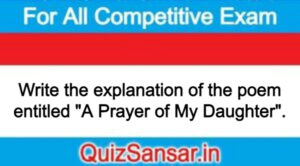
Write the explanation of the poem entitled “A Prayer of My Daughter”.
Write the explanation of the poem entitled “A Prayer of My Daughter”.
Ans.
Explanation
3. In courtesy I’d have her chiefly learned;
Hearts are not had as a gift but hearts are earned
By those that are not entirely beautiful;
Yet many, hat have played the fool
For beauty’s very self, has charm made wise,
And many a poor man that has roved,
Loved and thought himself beloved.
From a glad kindness cannot take his eyes.
May she become a flourishing hidden tree
That all her thoughts may like the linnet be,
And have no business but dispensing round
Their magnanimities of sound,
Nor but in merriment begin a chase
Nor bit in merriment a quarrel.
O may she live like some green laurel
Rooted in one dear perpetual places.
Explanation with Reference to Context- These lines are from W. B. Yeats‘ poem entitled ‘A Prayer for My Daughter’. The poet-father prays for his infant daughter Annie Butter Yeats. The poet is very anxious for the safety and well-being of his new-born child in a world naughty had anarchic. The child is sleeping innocently through a howling storm. The great problem in his mind is how to protect the innocent child from the wrath of the anarchic world. The poet becomes gloomy and prays for his daughter. The poet wants his daughter to have beauty but not so much beauty as to make her proud. The poet gives examples from history and legend of over-beautiful women who suffered much themselves and also caused great suffering to others because of their pride and vanity.
The poet prays that his daughter may be particularly gifted with courtesy. For hearts of lovers are not taken as gift, by those who are not fully beautiful. Lovers’ hearts are won by them by virtue of their good manners. Beauty was its own power, indeed. Yet the charm of courtesy has also made wise many lovers who have played the fool for the exceptional physical beauty of their beloveds. Many poor lovers of physical beauty, who have wandered in their beloved’s dreamlands, loved them passionately, and thought their sweethearts also loved them, have been found unable to take, their eyes of the face of a kind and courteous woman. The poet means to say that charming manners are more important for a woman than more physical beauty. A good mannered, sweet-tempered lady speaking kind words to everybody around her attracts all. The poet then prays that his daughter’s hidden soul may flourish like a tree, and that her thoughts may be an innocent and cheerful as the linnet’s notes. He also prays that her soul may have no business other than that of speaking words of courtesy [and doing deeds of kindness) to those around it out of her innocent and cheerful thoughts. She may not take a drink or start a quarrel except for the sake of fun. He also wishes her to love like a green laurel tree, having her roots in perpetual aristocratic tradition and courtesy. The poet considers a life rooted in tradition a happy life, and so wishes that her life should be rooted in one place and tradition, like a laurel tree. Such a fixity in place and tradition would result in the maximum of happiness for her. The poet prays for the daughter that she may become a flourishing hidden laurel tree symbolising peace and prosperity. She should be magnanimous and of good manners and she should play and quarrel only in merriment.
4. My mind because the minds that I have loved,
The sort of beauty that I have approved,
Prosper but little, has dried up of late,
Yet knows that to be choked with hate.
May well be of all evil chances chief.
If there’s no hatred in a mind
Assault and battery of the wind
Can never tear the linnet from the leaf.
An intellectual hatred is the worst,
So let her think opinions are accursed.
Have I not seen the loveliest woman born
Out of the mouth of Plenty’s horn,
Because of her opinionated mind
Barter that horn and every good
By get natures understood
For an old bellows full of angry wind?
Explanation with Reference to Context- These lines are from W.B. Yeats poem A Prayer for My Daughter’. The daughter here is Years new born child Annie Butler Yeats. The poet father prays for a happy life for his daughter. The world, he seeds is heading towards anarchy. The poet praises courtesy, charm, wisdom and the good manners (glad kindness). He wants his daughter to be free from hatred especially intellectual hatred. He says that courtesy is to be preferred to the perfection of physical charms. The poet-father prays that the soul of his daughter any grow and reach ‘self fulfilment like a flourishing tree:. He prays that cheerful and innocent thoughts may cluster round her soul as do linnets round a tree.
The poet says that recently he suffered much unhappiness to see that the people he had liked and the great beauty he had loved got only little happiness in life.
The poet says that his experience tells him that to have in one’s heart hatred for a person may well give rise to a great suffering for one’s soul. If there is no hatred in one’s mind, threats and buffets of the wind of misfortune can never disturb the composure of the soul. He wants that his daughter should be free from all feelings of hatred she should develop qualities of character and manners. To cherish some intellectual hatred is the worst fault in a person. The poet wants that his daughter should consider strong opinions detestable things. He has seen the fate of a most beautiful woman belonging to a well-to do family who, because of her strong opinions about herself, others, life, and politics, lost her happiness. She sacrificed her prosperity and all her good qualities appreciated by her quiet admirers, for becoming an out of date revolutionary orator full of words in favour of violent action with freedom for Ireland. She gained nothing. This is a reference to Maud Gonne whom the poet loved. She had refused to many Yeats.
Critical Note: (1) Intellectual hatred: The poet always complained Maud Gonne about her intellectual hatred’. Cf. a passage in his Diary 1910.
(2) Mark the complexity of the image- clusters of Yeats. The “Horn of Plenty of the IV stanza which symbolizes innocence and ceremony becomes ‘Plenty’s born’ in this stanza which means sweet voice, and is contrasted with ‘an old bellows full of angry wind’. This shows the richness of the poet’s images. The meaning, however, does not become obscure because the phrase is understood by its contrast, and in its context.
5. Considering that, all hatred driven hence,
The soul recovers radical innocence
And learns at last that it is self-delighting,
Self-appeasing, self-affrighting,
And that its own sweet will is Heaven’s will;
She can, though every face should scowl
And every windy quarter howl
Or every bellows burst, be happy still.
And may her bridegroom bring her to a house
Where all’s accustomed, ceremonious;
For arrogance and hatred are the wares
Peddled in the thoroughfares.
How but in custom and in ceremony
Are innocence and beauty born?
Ceremony’s a name for the rich horn,
And custom for the spreading laurel tree.
Explanation with Reference to Context- These lines are from W.B. Yeats’ poem ‘A Prayer for My Daughter’ The poet is anxious for the safety of his new born child Annie Butler Yeats, in a world which is growing more and more anarchic and troublesome. The child is leaping innocently through a howling stork. The screaming sea-winds are rising from the Atlantic. The great problem in the poet’s mind is how to protect the innocent child from wrath of the coming tides. The poet becomes gloomy and prays for his daughter The poet prays in the poem that his daughter he endowed with such virtues as courtesy, humility, innocence, etc. She should not be so beautiful as to make her proud and cruel. He prays that the soul, the inner life of his daughter should flourish and reach self-fulfillment, like a flourishing tree. The poet looks into himself and feels that he has developed too much of hatred. In a good mind, hatred must not be, and so he prays that his daughter should have as little hatred as possible. When there is no hatred. no buffets of misfortune can ruin the cheerfulness of a person.
If there is no hatred in mind
Assault and battery of wind
Can never tear the linnet from the leaf.
Intellectual hatred is the worst of all evils. So his daughter may be led to think that strong opinions are detestable things. The poet has seen that strong opinions brought misery to the loveliest woman i.e. Maud gonne. She was also born of a well-to-do family. Because of her strong opinions, however, she sacrificed her great beauty, prosperity, and all her merits to become an out dated revolutionary orator full of words of violent action.
Considering that absence of hatred keeps the soul radically innocent, self-delighting, contented, and self-shining, the poet’s daughter may feel that her sweet will is God’s will. Being free from hatred, she may always be happy, even though the whole world turns hostile to her and storms of misfortune blow against her. Finally, the poet wishes his daughter to be married to a man who belongs to a courteous aristocratic family. He prays to God that her husband may take her to his home of perpetual tradition and ceremonies. Hatred and arrogance are things belonging to the common people. Aristocratic, life is rooted to custom and ceremony which are the sources of innocence and beauty. Ceremonious courtesy is the source of happiness and success in life, and customary courtesy, the source of gladdening cheerfulness. The poet implies that aristocratic stands on ceremony, and pays great attention to rules of decent and refined behaviour. He then adds that usage of courtesy is another name for prosperity. And tradition stands for the growing laurel tree of life. The poet means that decent and refined courtesy leads to prosperity and happiness. And elegant customary behaviour leads to bright success and honour in life.
Critical Note: Mark the richness of the image-clusters. Sometimes the poet’s image evokes different images and sometimes the same image is used in different contexts. The ‘Horn or Plenty’ in the IV stanza became “Plenty’s Horn’ in the VIII stanza and in his last stanza it has become ‘the rich horn. In the same way ‘a flourishing hidden tree’ of the VI stanza has become in the last stanza ‘the spreading laurel tree.’
-
Write the critical appreciation of the poem No. 12 entitled Far Below Flowed.
-
Write the critical appreciation of the poem No. 11 entitled Leave this Chanting.






